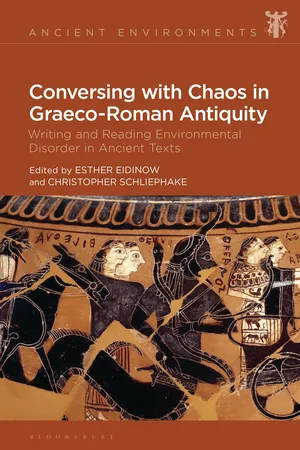
eBook - ePub
Conversing with Chaos in Graeco-Roman Antiquity
Writing and Reading Environmental Disorder in Ancient Texts
- 232 pages
- English
- ePUB (mobile friendly)
- Available on iOS & Android
eBook - ePub
Conversing with Chaos in Graeco-Roman Antiquity
Writing and Reading Environmental Disorder in Ancient Texts
About this book
How did ancient Greeks and Romans perceive their environments: did they see order or chaos, chance or control? And how do their views compare to modern perceptions? Conversing with Chaos in Graeco-Roman Antiquity challenges prevailing ideas that ancient perceptions of the non-human world rested on a profound belief in universal order, and that the cosmos was harmonious and under human control. Engaging with the concept of chaos in both its ancient and modern meanings, and focusing on the ancient Mediterranean and Near East, this book reveals another sense of environmental awareness, one that paid equal attention to chance and chaos, and the sometimes-fatal consequences of human interventions in nature.
Bringing together a team of international scholars, the volume investigates the experience of the interaction of humans with the environment, as reflected in ancient evidence from myths and philosophical treatises, to epigraphic evidence and archaeological remains. The contributors consider the role of the human in the formation of perspectives about the natural world and explore themes of agency, affordances, ecophobia, gender and temporality. Overall, the volume reveals how, in ancient imaginations, environments were perceived as living entities with their own agency, and respondent (or even vulnerable) to human actions and decision-making. It highlights how modern insights can enrich our understanding of the past, and demonstrates the increasing relevance of ancient historical research for reflecting on current relations to the natural world.
Bringing together a team of international scholars, the volume investigates the experience of the interaction of humans with the environment, as reflected in ancient evidence from myths and philosophical treatises, to epigraphic evidence and archaeological remains. The contributors consider the role of the human in the formation of perspectives about the natural world and explore themes of agency, affordances, ecophobia, gender and temporality. Overall, the volume reveals how, in ancient imaginations, environments were perceived as living entities with their own agency, and respondent (or even vulnerable) to human actions and decision-making. It highlights how modern insights can enrich our understanding of the past, and demonstrates the increasing relevance of ancient historical research for reflecting on current relations to the natural world.
Frequently asked questions
Yes, you can cancel anytime from the Subscription tab in your account settings on the Perlego website. Your subscription will stay active until the end of your current billing period. Learn how to cancel your subscription.
No, books cannot be downloaded as external files, such as PDFs, for use outside of Perlego. However, you can download books within the Perlego app for offline reading on mobile or tablet. Learn more here.
Perlego offers two plans: Essential and Complete
- Essential is ideal for learners and professionals who enjoy exploring a wide range of subjects. Access the Essential Library with 800,000+ trusted titles and best-sellers across business, personal growth, and the humanities. Includes unlimited reading time and Standard Read Aloud voice.
- Complete: Perfect for advanced learners and researchers needing full, unrestricted access. Unlock 1.4M+ books across hundreds of subjects, including academic and specialized titles. The Complete Plan also includes advanced features like Premium Read Aloud and Research Assistant.
We are an online textbook subscription service, where you can get access to an entire online library for less than the price of a single book per month. With over 1 million books across 1000+ topics, we’ve got you covered! Learn more here.
Look out for the read-aloud symbol on your next book to see if you can listen to it. The read-aloud tool reads text aloud for you, highlighting the text as it is being read. You can pause it, speed it up and slow it down. Learn more here.
Yes! You can use the Perlego app on both iOS or Android devices to read anytime, anywhere — even offline. Perfect for commutes or when you’re on the go.
Please note we cannot support devices running on iOS 13 and Android 7 or earlier. Learn more about using the app.
Please note we cannot support devices running on iOS 13 and Android 7 or earlier. Learn more about using the app.
Yes, you can access Conversing with Chaos in Graeco-Roman Antiquity by Esther Eidinow, Christopher Schliephake, Esther Eidinow,Christopher Schliephake in PDF and/or ePUB format, as well as other popular books in History & Ancient History. We have over one million books available in our catalogue for you to explore.
Information
Table of contents
- Cover
- Half-Title Page
- Series Page
- Title Page
- Contents
- List of Contributors
- Preface
- List of Abbreviations
- Introduction
- Part I Control
- 1. Perilous Environs: The Rustic World in Aratus and Nicander
- 2. Shared Suffering and Cyclical Destruction: Failures of Environmental Control in the Aeneid
- 3. Chaos and Kosmos: An Ecocritical Reading of Seneca’s Thyestes
- Part II Connection
- 4. The Interspecies and Trans-Corporeal Mesh in Euripides’ Bacchae
- 5. The Relationality of Darkness in Thucydides
- 6. The Only Constant Is Change: The Environmental Dimension of Plutarch’s De defectu oraculorum
- Part III Contact
- 7. Poseidon’s Mode of Action: Divine Agency and the Helike Disaster
- 8. River, Agency and Gender: An Ecocritical Reading of the Myths of the Tiber
- 9. Ecological Grief and the Safaitic Inscriptions of Ancient North Arabia
- Part IV Change
- 10. Ecological Grief in Aelius Aristides and Philostratus
- 11. An Allegory of the Anthropocene: Environmental and Textual Disorder in Claudian’s De raptu Proserpinae
- 12. The Environmental Ethics of Delphi: Back-filling Latour’s Facing Gaia
- Bibliography
- Index
- Copyright